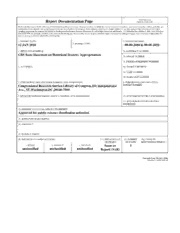Table Of ContentReport Documentation Page Form Approved
OMB No. 0704-0188
Public reporting burden for the collection of information is estimated to average 1 hour per response, including the time for reviewing instructions, searching existing data sources, gathering and
maintaining the data needed, and completing and reviewing the collection of information. Send comments regarding this burden estimate or any other aspect of this collection of information,
including suggestions for reducing this burden, to Washington Headquarters Services, Directorate for Information Operations and Reports, 1215 Jefferson Davis Highway, Suite 1204, Arlington
VA 22202-4302. Respondents should be aware that notwithstanding any other provision of law, no person shall be subject to a penalty for failing to comply with a collection of information if it
does not display a currently valid OMB control number.
1. REPORT DATE 3. DATES COVERED
12 JAN 2010 2. REPORT TYPE 00-00-2010 to 00-00-2010
4. TITLE AND SUBTITLE 5a. CONTRACT NUMBER
CRS Issue Statement on Homeland Security Appropriations
5b. GRANT NUMBER
5c. PROGRAM ELEMENT NUMBER
6. AUTHOR(S) 5d. PROJECT NUMBER
5e. TASK NUMBER
5f. WORK UNIT NUMBER
7. PERFORMING ORGANIZATION NAME(S) AND ADDRESS(ES) 8. PERFORMING ORGANIZATION
Congressional Research Service,Library of Congress,101 Independence REPORT NUMBER
Ave., SE,Washington,DC,20540-7500
9. SPONSORING/MONITORING AGENCY NAME(S) AND ADDRESS(ES) 10. SPONSOR/MONITOR’S ACRONYM(S)
11. SPONSOR/MONITOR’S REPORT
NUMBER(S)
12. DISTRIBUTION/AVAILABILITY STATEMENT
Approved for public release; distribution unlimited
13. SUPPLEMENTARY NOTES
14. ABSTRACT
15. SUBJECT TERMS
16. SECURITY CLASSIFICATION OF: 17. LIMITATION OF 18. NUMBER 19a. NAME OF
ABSTRACT OF PAGES RESPONSIBLE PERSON
a. REPORT b. ABSTRACT c. THIS PAGE Same as 3
unclassified unclassified unclassified Report (SAR)
Standard Form 298 (Rev. 8-98)
Prescribed by ANSI Std Z39-18
.
CRS Issue Statement on Homeland Security
Appropriations
Jennifer E. Lake, Coordinator
Analyst in Domestic Security
Chad C. Haddal, Coordinator
Analyst in Immigration Policy
January 12, 2010
Congressional Research Service
7-5700
www.crs.gov
IS40579
CRS Report for Congress
Prepared for Members and Committees of Congress
c11173008
.
CRS Issue Statement on Homeland Security Appropriations
T
he terrorist attacks of September 11, 2001, launched an intense and extended examination
of the nation’s homeland security apparatus. One of the outcomes of this examination was
the establishment of the Department of Homeland Security (DHS, the Department). DHS
was designed to house under one roof the agencies responsible for major elements of the nation’s
homeland security effort, including aviation security and the security of other modes of
transportation, immigration control and enforcement, critical infrastructure protection, emergency
preparedness and response, and science and technology research for homeland security. These
missions continue to be of significant focus and interest to Congress. In recent sessions, Congress
has grappled with a series of specific overarching issues that complicate the debates over the
annual provision of appropriations for the Department.
One overarching issue confronting appropriators is determining the appropriate allocation of
resources among the nation’s critical, competing homeland security mission areas. Appropriators
are challenged with the difficult task of providing sufficient resources to achieve a base level of
security in a volatile threat and risk environment. Appropriators must annually assess the relative
importance of competing mission areas and make determinations regarding which missions will
provide the most effective returns on investment. They must also evaluate how these missions fit
into a broader national homeland security strategy—both between and within agencies.
One element of the debates surrounding the creation of DHS was concern over the non-homeland
security (or non-terrorist-related) functions that were being incorporated into the Department.
Examples of these functions include the disaster relief mission of the Federal Emergency
Management Agency (FEMA), and the maritime safety and stewardship responsibilities of the
U.S. Coast Guard. Whereas the USCG retains major homeland security mission sets, after
Katrina, some have questioned whether FEMA should still remain within the department. The
proper allocation of resources between homeland and non-homeland security functions within the
Department will continue to be a focus. FEMA’s position within the Executive Branch
organization may also be an issue for Congress.
The current economic downturn will further challenge appropriators. Several DHS activities are
at least partially funded through offsetting fee receipts. Many of these fees are derived from
charges levied on the travel, trade, and immigration transactions that occur at the nation’s borders.
When travel and trade decline, user-fee revenue declines, and thus less revenue is available to
offset the Department’s appropriation. Congress faces the possibility of having to provide
additional appropriations to the Department to cover the declining fee revenue. More
fundamentally, questions can be raised about the degree to which inherently governmental
security functions should be fee dependent. U.S. Citizenship and Immigration Service (USCIS),
for example, is almost entirely fee funded.
The complexity of the structure of DHS, formed from several legacy and newly created agencies,
further complicates the appropriators’ responsibility to oversee the execution of the department’s
budget and evaluate its performance. This is especially difficult given the number of cross-
component functions, such as intelligence, counternarcotics, and research and development
activities. Funding and evaluation of these Department-wide functions will continue to be of
significant concern to Congress.
Congressional Research Service 1
.
CRS Issue Statement on Homeland Security Appropriations
Issue Team Members
Jennifer E. Lake, Coordinator Sarah A. Lister
Analyst in Domestic Security Specialist in Public Health and Epidemiology
[email protected], 7-0620 [email protected], 7-7320
Chad C. Haddal, Coordinator Francis X. McCarthy
Analyst in Immigration Policy Analyst in Emergency Management Policy
[email protected], 7-3701 [email protected], 7-9533
Bart Elias Daniel Morgan
Specialist in Aviation Policy Specialist in Science and Technology Policy
[email protected], 7-7771 [email protected], 7-5849
John Frittelli John D. Moteff
Specialist in Transportation Policy Specialist in Science and Technology Policy
[email protected], 7-7033 [email protected], 7-1435
William A. Kandel Shawn Reese
Analyst in Immigration Policy Analyst in Emergency Management and Homeland
[email protected], 7-4703 Security Policy
[email protected], 7-0635
Lennard G. Kruger Barbara L. Schwemle
Specialist in Science and Technology Policy Analyst in American National Government
[email protected], 7-7070 [email protected], 7-8655
Bruce R. Lindsay Alison Siskin
Analyst in Emergency Management Policy Specialist in Immigration Policy
[email protected], 7-3752 [email protected], 7-0260
Congressional Research Service 2

